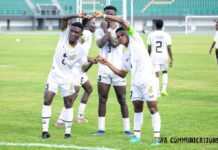
Ghana Youth Manifesto Report Validation Workshop successfully took place at the Balme Library of the University of Ghana (UG), on November 23, 2023, in Accra.
The event was organized by a Network of Youth Groups and youth centered Civil Society Organizations (CSOs) such as Foundation for Security Development in Africa (FOSDA), Eduwatch, WANEP.
Others organizing CSOs and partners also include ActionAid/Global Platform, OXFAM in Ghana, NORSAAC, YAG and Yell-Ghana among others.
The workshop actively involved the youth of Ghana in influencing upcoming policies and initiatives leading up to the 2024 General Elections.
Several sister CSOs, including WANEP, EduWatch, YAG, OXFAM in Ghana, Action Aid, Yell-Ghana, and NORSAAC, conveyed messages of solidarity.
In a brief remark the Executive Director of FOSDA, Theodora Williams Anti emphasized that FOSDA, as a Civil Society Organization focused on Peace and Security, is actively assisting youth core groups in spearheading the creation of the Ghana Youth manifesto for the 2024 elections and beyond.

“And so our interest is to make sure that young people are engaged, young people are part of the decision-making process and are part of the system that can help their own development and make input into their own development affairs’” madam Williams Anti stated.
In his address the President of the National Network of Youth Groups, Ali Ibraheem explained how the Ghanaian youth should be actively involved in the decision making in the country.
According to him, the reasonable risk of defeat and alternation in power has raised the stakes in Ghana’s binary, zero-sum electoral politics, where public contracts, jobs, and other such opportunities and resources routinely change hands after a party turnover in government.
“This, in turn, has turned Ghana’s general elections into a “do-or-die” affair between the NDC and NPP, with each side marshaling all possible means and resources, fair and foul alike, to wrestle or retain power—the recent bi-elections in the Kumewu and Asin North point to this growing trend in our body politics.

“On the positive side, the fact that both parties must reach beyond their respective identity-defined electoral strongholds to maximize their chances of victory in fiercely-contested national elections is encouraging a turn toward “issue-based” politics and, with it, a rise in the electoral relevance and value of the party campaign manifesto,” Mr. Ibraheem stated.
He continued: “Given that we the youth constitute the majority of the nation’s voting population, they were the main target of the various campaign messages in the 2020 general election, particularly those concerning Education and Job creation, to capture their support.

“In 2020, most Ghanaians who registered to vote were between the ages of 18 and 35, approximately 9.4 million youth, representing 55.1 percent of the total voter population, including over 2.6 million first-time voters. This figure is projected to be 10.2 million by the 2024 general election based on the population growth of 2 percent annually.”
The Senior Programs Manager for FOSDA, Solomon Okai also gave a rich presentation on what FOSDA has been engaged in youth activities.
Source: Ghana/Starrfm.com.gh/103.5FM




